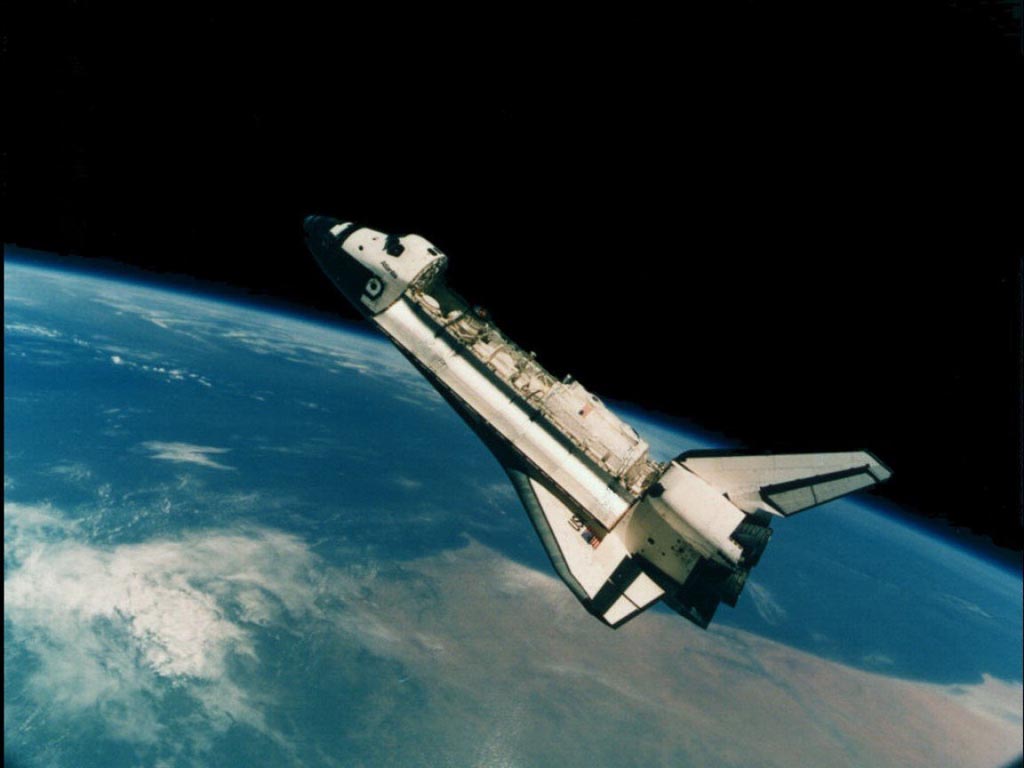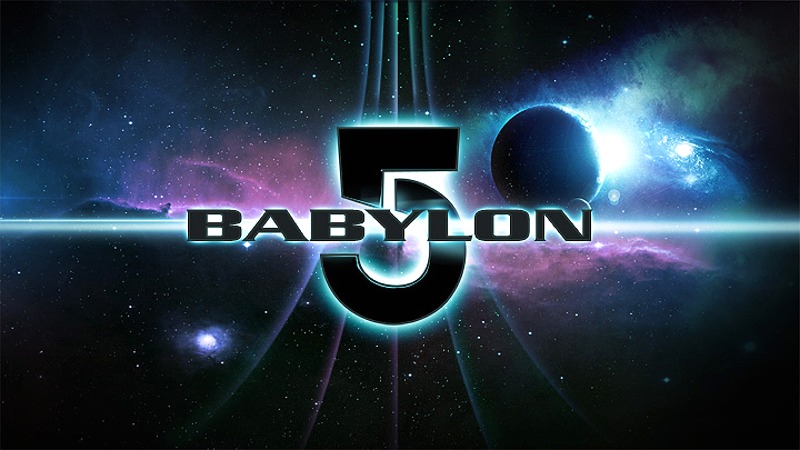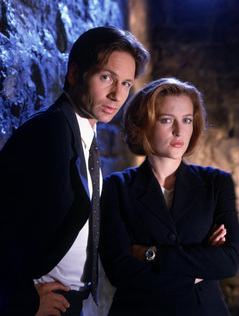 Out of all the genres that exist Science Fiction is the most ambitious. At its best it seeks to create whole new worlds, universes and perceptions of reality beyond the realm of anything we have yet known. It can be based upon the fundamentals of our own society or it can eschew Earthbound monotony in favour of the bizarre and wondrous. Science Fiction can peer into space, matter, time or the mind with equal comfort and frequently endeavours to obscure the distinctions between them for the sake of not only dramatic effect but philosophical exploration as well. Science Fiction can be poetically subtle or bombastically symphonic, true to life or mind-bendingly surreal. Not to mention all points in between. Above all that it can simply be a damn good time.
Out of all the genres that exist Science Fiction is the most ambitious. At its best it seeks to create whole new worlds, universes and perceptions of reality beyond the realm of anything we have yet known. It can be based upon the fundamentals of our own society or it can eschew Earthbound monotony in favour of the bizarre and wondrous. Science Fiction can peer into space, matter, time or the mind with equal comfort and frequently endeavours to obscure the distinctions between them for the sake of not only dramatic effect but philosophical exploration as well. Science Fiction can be poetically subtle or bombastically symphonic, true to life or mind-bendingly surreal. Not to mention all points in between. Above all that it can simply be a damn good time.
Science Fiction, or at least embryonic forms of it first began to emerge at the end of the nineteenth century. H.G Wells is widely regarded as the genre’s first pioneer. With works like The Time Machine, War Of The Worlds, The Island Of Dr. Moreau and The Shape Of Things To Come he created the foundations upon which most science fiction is still built. By harnessing the power of their readers’ imaginations science fiction creators were able to easily construct fantastic worlds within which they could set their adventures. With the birth and spread of radio, the first people to bring the genre to this new medium were able to augment the audience’s imaginations with sound. However the advent of the visual mediums presented a new challenge. Science Fiction creators had to actually show the audience a glimpse of their fictional worlds. A process which is not only incredibly difficult but often prohibitively expensive. While film, with its massive budgets, greater creative freedom and relatively short running times was handily able to adapt to this challenge creating engrossing, imaginative science fiction for television presents a unique set of obstacles. Even in their shortest forms, science fiction television often runs twice to three times the length of even the most epic Sci-Fi film. Getting controversial or unorthodox subject matter on the air can be considerably difficult thanks to the nature of advertising revenue and the overall perception of television as a “lowest common denominator” medium when compared to film. In addition the budgets are often much smaller, requiring creators to do far more with less. Nonetheless, over the years several visionaries have stepped up to the plate and created some of the most spellbinding science fiction tales yet. In keeping with the three other similar pieces I have written, this is a list of ten interesting and entertaining examples of science fiction television. These are not ranked in any particular order, nor do I necessarily think they are collectively “the best” sci-fi shows ever, merely ten excellent samples. Also, since many science fiction tv series are connected to larger franchises I’ve tried to stop myself from doubling up as much as possible. Just for the sake of variety and to make my life even more difficult I’ve decided not to include any entry from the Star Trek franchise, which is the grandaddy of television Sci-Fi.
Quatermass And The Pit (1958-1959: BBC)Despite our supposed mastery over Earth humanity is still routinely surprised by new and fascinating discoveries which emerge from our planet’s hidden corners. Sometimes these secrets can even be found in our own backyards. Quatermass And The Pit is a tale about when one such discovery goes horribly awry. Set in the post-war reconstruction of Blitz ravaged London, it centres around the unexpected discovery of an alien vessel by a construction crew. While at first the discovery is merely a curiosity, it quickly begins to divulge disturbing secrets about an ancient otherworldly genocide and its ramifications for Earth. All the while the vessel begins exerting a sinister influence over those nearby and its mysterious power grows quickly. British scientist Bernard Quatermass must quickly unlock the enigma of the ancient pod and undo its effects before it can consume the world. The second series of a critically acclaimed trilogy of serials, Quatermass And The Pit is still dark, atmospheric, subtle and unsettling, despite its age.
V (1983: NBC) As the old adage goes: “beware of Greeks bearing gifts.” In this famed two part miniseries, which would later spawn a sequel, television series and now a sub-par remake, mankind makes unexpected first contact with a seemingly benevolent species of advanced extra-terrestrials who claim they desire only peaceful trade and contact. Beguiled by their technology and their unexpected physical similarity to humans, much of the world fall under the enigmatic Visitors’ spell. Only a cynical few remain suspicious enough of the newcomers to notice that their actions on Earth contradict their peaceful message. Now finding themselves in a pitched battle with the aliens and their human collaborators, the few holdouts quickly discover that they are fighting not only for their own survival but the survival of the planet as well. Very loosely based on the novel It Can’t Happen Here, this powerful Holocaust parallel is still very effective despite the occasionally cheesy 1980s veneer.
As the old adage goes: “beware of Greeks bearing gifts.” In this famed two part miniseries, which would later spawn a sequel, television series and now a sub-par remake, mankind makes unexpected first contact with a seemingly benevolent species of advanced extra-terrestrials who claim they desire only peaceful trade and contact. Beguiled by their technology and their unexpected physical similarity to humans, much of the world fall under the enigmatic Visitors’ spell. Only a cynical few remain suspicious enough of the newcomers to notice that their actions on Earth contradict their peaceful message. Now finding themselves in a pitched battle with the aliens and their human collaborators, the few holdouts quickly discover that they are fighting not only for their own survival but the survival of the planet as well. Very loosely based on the novel It Can’t Happen Here, this powerful Holocaust parallel is still very effective despite the occasionally cheesy 1980s veneer.
Firefly (2002: FOX) Despite FOX’s best efforts this criminally mishandled thirteen episode series has transcended its initial disastrous airing to become not only a beloved cult favourite but one of the most respected Science Fiction television series ever. An odd mix of Western and Science Fiction, Firefly is an occasionally tragic, often funny and consistently gripping tale of a crew full of nere-do-wells, refugees and freelancers simply trying to make their way in a shabby, unforgiving universe aboard the rickety transport Serenity. With no monsters or aliens to be found, the series focused instead on the varied backgrounds of the core seven characters, their interactions and their often questionable attempts to simply get by.
Despite FOX’s best efforts this criminally mishandled thirteen episode series has transcended its initial disastrous airing to become not only a beloved cult favourite but one of the most respected Science Fiction television series ever. An odd mix of Western and Science Fiction, Firefly is an occasionally tragic, often funny and consistently gripping tale of a crew full of nere-do-wells, refugees and freelancers simply trying to make their way in a shabby, unforgiving universe aboard the rickety transport Serenity. With no monsters or aliens to be found, the series focused instead on the varied backgrounds of the core seven characters, their interactions and their often questionable attempts to simply get by.
Favourite Episode: “Jaynestown”. The ship’s resident amoral thug, Jayne Cobb, finds himself the unlikely idol of an impoverished community desperate for a hero. While initially flabbergasted the crew quickly devise a way to take advantage of the town’s adulation, despite Jayne’s reservations.
Lexx (1997-2002: Global/SPACE) Sensual, depraved, violent and perverse, the Halifax shot Lexx is one of the most unapologetically bizarre shows to ever grace the small screen. Stanley Tweedle is a former resistance fighter turned minion of an uber-dystopian theocratic empire, who finds himself accidentally the sole master of the Lexx, an immense space-faring insect with the power to destroy worlds with a single shot. Paired with a half-lizard half-love slave who finds him revolting sexually, a cyborg head who hates him and an undead assassin, Stanley quickly involves himself embroiled in a millenia old war. Despite being petty, selfish and lecherous Stanley sincerely tries to become a force for good, only to frequently make things worse. Despite its tiny budget compared to other Sci-Fi series and its unorthodox subject matter Lexx is nonetheless an ambitious and darkly imaginative series. Though it may not be to everyone’s taste.
Sensual, depraved, violent and perverse, the Halifax shot Lexx is one of the most unapologetically bizarre shows to ever grace the small screen. Stanley Tweedle is a former resistance fighter turned minion of an uber-dystopian theocratic empire, who finds himself accidentally the sole master of the Lexx, an immense space-faring insect with the power to destroy worlds with a single shot. Paired with a half-lizard half-love slave who finds him revolting sexually, a cyborg head who hates him and an undead assassin, Stanley quickly involves himself embroiled in a millenia old war. Despite being petty, selfish and lecherous Stanley sincerely tries to become a force for good, only to frequently make things worse. Despite its tiny budget compared to other Sci-Fi series and its unorthodox subject matter Lexx is nonetheless an ambitious and darkly imaginative series. Though it may not be to everyone’s taste.
Favourite Episode: “End of the Universe”. In order to destroy a nearly invincible, galaxy eating foe the crew of the Lexx decide the only viable course of action is to destroy an entire universe by creating a Big Crunch centered around themselves.
Babylon 5 (1994-1998: PTEN) An interesting and finely written series, Babylon 5 had the grave misfortune of trying to compete against two different Star Trek series during its run, one of which, Deep Space 9, was incredibly similar in premise. The overarching plot initially focused on humanity’s return to interstellar politics not long after they were nearly wiped out in a massive war against a mysterious alien race. A conflict which was started by a simple cultural misunderstanding. Humbled mankind abandons its old expansionism in favour of interspecies co-operation, facilitated by their new space station Babylon 5. However humanity soon finds itself embroiled in high politics and an ancient secret conflict few even know is occurring. Along the way notions of destiny and self-determination are explored. Often called ‘a novel for television’ Babylon 5 is a thinking person’s space opera, weaving several interconnected stories together over the course of the entire run. While the first season is considerably inferior to the following ones and it can seem a bit dated at times, Babylon 5 is nonetheless an absolute gem with an unmatchable story and large cast of well developed characters.
An interesting and finely written series, Babylon 5 had the grave misfortune of trying to compete against two different Star Trek series during its run, one of which, Deep Space 9, was incredibly similar in premise. The overarching plot initially focused on humanity’s return to interstellar politics not long after they were nearly wiped out in a massive war against a mysterious alien race. A conflict which was started by a simple cultural misunderstanding. Humbled mankind abandons its old expansionism in favour of interspecies co-operation, facilitated by their new space station Babylon 5. However humanity soon finds itself embroiled in high politics and an ancient secret conflict few even know is occurring. Along the way notions of destiny and self-determination are explored. Often called ‘a novel for television’ Babylon 5 is a thinking person’s space opera, weaving several interconnected stories together over the course of the entire run. While the first season is considerably inferior to the following ones and it can seem a bit dated at times, Babylon 5 is nonetheless an absolute gem with an unmatchable story and large cast of well developed characters.
Favourite Episode: “The Long, Twilight Struggle”. A running subplot of the series was the violent rivalry between the imperialistic Centuari race and their former vassals, the Narn who liberated themselves via an uprising decades before. With war between the two species waging once again, the station’s crew try fruitlessly to resolve the conflict, unaware that the Centuari have already begun an apocalyptic assault on the Narn home planet.
The X Files (1993-2002: FOX) Not all Science Fiction journeys need to touch the farthest horizons to be compelling. In the much loved FOX series The X Files, an FBI agent with a traumatic past and an obsession with the paranormal, Fox Mulder, and his skeptical partner, Dana Scully, struggle to uncover unknown phenomena, secret histories and shadowy figures. The sole people assigned to a special division of the FBI, their professional mission becomes a personal quest for both of them when they begin to unravel the secrets of a massive conspiracy with otherwordly connections. A conspiracy with dire consequences. Moody and chilling the series equally balanced the extraterrestrial, the supernatural and the human, wrapping them all up in a style which hearkened back to the conspiracy thrillers of the 1970s. Grounded in the new agey zeitgeist of the 1990s, the fear of the approaching millennium, the post JFK American tendency for conspiracism and several high profile crises involving the FBI (Waco, Ruby Ride etc), the show had an oddly true to life feel which was accentuated by the use of mundane, everyday settings to contrast the paranormal events unfolding.
Not all Science Fiction journeys need to touch the farthest horizons to be compelling. In the much loved FOX series The X Files, an FBI agent with a traumatic past and an obsession with the paranormal, Fox Mulder, and his skeptical partner, Dana Scully, struggle to uncover unknown phenomena, secret histories and shadowy figures. The sole people assigned to a special division of the FBI, their professional mission becomes a personal quest for both of them when they begin to unravel the secrets of a massive conspiracy with otherwordly connections. A conspiracy with dire consequences. Moody and chilling the series equally balanced the extraterrestrial, the supernatural and the human, wrapping them all up in a style which hearkened back to the conspiracy thrillers of the 1970s. Grounded in the new agey zeitgeist of the 1990s, the fear of the approaching millennium, the post JFK American tendency for conspiracism and several high profile crises involving the FBI (Waco, Ruby Ride etc), the show had an oddly true to life feel which was accentuated by the use of mundane, everyday settings to contrast the paranormal events unfolding.
Favourite Episode: “The Field Where I Died”. During a potentially explosive FBI standoff with a Branch Davidian style cult, Mulder comes in contact with a member of the organization who claims to have known him in a past life. As Mulder explores her story he begins to believe that she may be telling the truth and that through life after life, certain souls have a tendency to be drawn to each other over and over again. Unfortunately their meetings often do not end happily. With tensions rising, Mulder desperately seeks a way to end the standoff before the cult does something drastic all the while trying to reconnect with his possible past lives.
Battlestar Galactica (2004-2009: Sky1/Sci-Fi) It is truly extraordinary that something so campy, so cheesy, so slap-dash as the 1978 scholck fest Battlestar Galactica could give birth to such a gritty masterpiece. Born out of a critically acclaimed television miniseries, Ron D. Moore’s follow up outdid its predecessor in scale and drama. Following an extraterrestrial branch of mankind’s destruction at the hands of their vengeful robotic former slaves, the shattered remnants are forced to flee into the depths of space defended by the last surviving warship of their once proud fleet: an ageing, nearly obsolete battlestar called the Galactica. Running short of supplies, the survivors are forced to deal not only with a large enemy armada relentlessly hunting them but their own human weaknesses and political power games as well. Beneath it all runs a subtle undercurrent of the mysterious and possibly ethereal as both cylon and human begin to wonder if they are merely playing their parts in a continually repeating cycle of destruction and rebirth. Polarizing, topical and unafraid to take chances, Battlestar Galactica is superb.
It is truly extraordinary that something so campy, so cheesy, so slap-dash as the 1978 scholck fest Battlestar Galactica could give birth to such a gritty masterpiece. Born out of a critically acclaimed television miniseries, Ron D. Moore’s follow up outdid its predecessor in scale and drama. Following an extraterrestrial branch of mankind’s destruction at the hands of their vengeful robotic former slaves, the shattered remnants are forced to flee into the depths of space defended by the last surviving warship of their once proud fleet: an ageing, nearly obsolete battlestar called the Galactica. Running short of supplies, the survivors are forced to deal not only with a large enemy armada relentlessly hunting them but their own human weaknesses and political power games as well. Beneath it all runs a subtle undercurrent of the mysterious and possibly ethereal as both cylon and human begin to wonder if they are merely playing their parts in a continually repeating cycle of destruction and rebirth. Polarizing, topical and unafraid to take chances, Battlestar Galactica is superb.
Favourite Episode: “Exodus Part II”. Outgunned and badly undermanned, the Galactica is forced to assault a cylon occupied planet single handedly in order to rescue thousands of civilians. Highlights include a one on four ship battle and what has been dubbed by fans as the fans as the “Adama Maneuver.”
Max Headroom (1987-1988: ABC/Cinemax) One of the few cyberpunk T.V series to ever make it to western airwaves, Max Headroom is something of an oddity. A darkly sardonic satire of the rise of commercialism, consumption and corporate culture, it was ahead of its time and frequently prescient. It focused on Edison Carter, an old school investigative journalist working in a field now dominated by corporate interests and sensationalism (imagine that!) and his jittery, hyperactive digital clone Max Headroom, who was accidentally created after Carter got into a motorcycle accident. While Max cruises the expansive digital world, Carter hits the crowded and brightly lit streets of a gaudy cyberpunk metropolis to uncover corporate malfeasance and government corruption. A bitterly sarcastic jab at the consequences of modern urban expansion, the growth of the information society and relentless ad-creep.
One of the few cyberpunk T.V series to ever make it to western airwaves, Max Headroom is something of an oddity. A darkly sardonic satire of the rise of commercialism, consumption and corporate culture, it was ahead of its time and frequently prescient. It focused on Edison Carter, an old school investigative journalist working in a field now dominated by corporate interests and sensationalism (imagine that!) and his jittery, hyperactive digital clone Max Headroom, who was accidentally created after Carter got into a motorcycle accident. While Max cruises the expansive digital world, Carter hits the crowded and brightly lit streets of a gaudy cyberpunk metropolis to uncover corporate malfeasance and government corruption. A bitterly sarcastic jab at the consequences of modern urban expansion, the growth of the information society and relentless ad-creep.
Favourite Episode: “Blipverts”. Edison and Max try to expose a cover up surrounding attempts to create high intensity, neural advertisements which prove fatal to potential consumers.
Farscape (1999-2003: Sci-Fi) While its premise bears a striking resemblance to Lexx, the resulting program was very different. Using ground breaking special effects and top notch animatronics provided by the Jim Henson company, Farscape‘s producers created a fictional universe which was often truly alien and far more substantive than those found in programs who rely almost exclusively on CGI and green screens. John Crichton is a modern day astronaut who is hurled through a wormhole and stranded in another part of the galaxy. Stuck aboard a living whale-like starship with an oddball assortment of escaped prisoners, John is an naive accidental tourist trying to cope with the radically different forms of life and society he encounters on a daily basis. Worse still, his accidental journey through the wormhole inadvertently gives him the knowledge to potentially create and navigate the anomalies. Knowledge that makes John a tempting prize for all manner of would be tyrants and psychotic low-lives. Farscape is a frequently surreal drama with a character driven plot and a dark streak a mile wide.
While its premise bears a striking resemblance to Lexx, the resulting program was very different. Using ground breaking special effects and top notch animatronics provided by the Jim Henson company, Farscape‘s producers created a fictional universe which was often truly alien and far more substantive than those found in programs who rely almost exclusively on CGI and green screens. John Crichton is a modern day astronaut who is hurled through a wormhole and stranded in another part of the galaxy. Stuck aboard a living whale-like starship with an oddball assortment of escaped prisoners, John is an naive accidental tourist trying to cope with the radically different forms of life and society he encounters on a daily basis. Worse still, his accidental journey through the wormhole inadvertently gives him the knowledge to potentially create and navigate the anomalies. Knowledge that makes John a tempting prize for all manner of would be tyrants and psychotic low-lives. Farscape is a frequently surreal drama with a character driven plot and a dark streak a mile wide.
Favourite Episode: “Liars Guns And Money”. One of the crew members, alien warrior D’Argo, discovers that his long lost son has been enslaved and is being auctioned off as a part of a group of 10,000. In desperation the crew devise a scheme to raid a heavily defended bank called the Shadow Depository in order to gather enough funds to buy the slaves’ freedom. In order to succeed the crew are forced to put together a crack team of scumbags and mercenaries with special skills, to get the job done. One of which just happens to be an old enemy turned unlikely ally.
Dune & Children Of Dune (2000/2003: Sci-Fi) Despite having an enormous budget and an immensely talent director at its helm the big screen adaptation of Frank Herbert’s seminal novel Dune has a mixed reputation among fans of the original work for its radical departure from the source material. In 2000 the Sci-Fi channel commissioned a three part epic adaptation of the novel. Fairly faithful to the book, beautifully cinematic and terrifically acted it lovingly captured Herbert’s grandiose, ornamental universe without being as plodding as David Lynch’s cinematic equivalent. It won numerous awards and was so successful that a second three part miniseries, adapting the next two books in the saga: Dune Messiah and Children of Dune, was commissioned. The two series follows the rise, fall and later meteoric ascent of the Atreides family as it navigates the treacherous military, economic and political realities of a far future human interstellar empire. In a world where computers are banned by religious order, human space travel is dependent on a rare commodity simply called “spice”. Found only on the desert world Arrakis, the substance is much prized not only for its central role in space travel but for its ability to alter and expand the human mind in fantastic new ways. Three generations of Atreides battle against a powerful Emperor, an ancient rival family, a treacherous religious order and a myriad of secret societies, not only for control of the spice but for the survival of their line and possibly the destiny of mankind. With an enormous cast of award winning actors from all around the world, an enchanting visual style and one of the most epic plots stories ever written, Dune and Children of Dune are must watch classics, even if you aren’t a Sci-Fi fan.
Despite having an enormous budget and an immensely talent director at its helm the big screen adaptation of Frank Herbert’s seminal novel Dune has a mixed reputation among fans of the original work for its radical departure from the source material. In 2000 the Sci-Fi channel commissioned a three part epic adaptation of the novel. Fairly faithful to the book, beautifully cinematic and terrifically acted it lovingly captured Herbert’s grandiose, ornamental universe without being as plodding as David Lynch’s cinematic equivalent. It won numerous awards and was so successful that a second three part miniseries, adapting the next two books in the saga: Dune Messiah and Children of Dune, was commissioned. The two series follows the rise, fall and later meteoric ascent of the Atreides family as it navigates the treacherous military, economic and political realities of a far future human interstellar empire. In a world where computers are banned by religious order, human space travel is dependent on a rare commodity simply called “spice”. Found only on the desert world Arrakis, the substance is much prized not only for its central role in space travel but for its ability to alter and expand the human mind in fantastic new ways. Three generations of Atreides battle against a powerful Emperor, an ancient rival family, a treacherous religious order and a myriad of secret societies, not only for control of the spice but for the survival of their line and possibly the destiny of mankind. With an enormous cast of award winning actors from all around the world, an enchanting visual style and one of the most epic plots stories ever written, Dune and Children of Dune are must watch classics, even if you aren’t a Sci-Fi fan.


